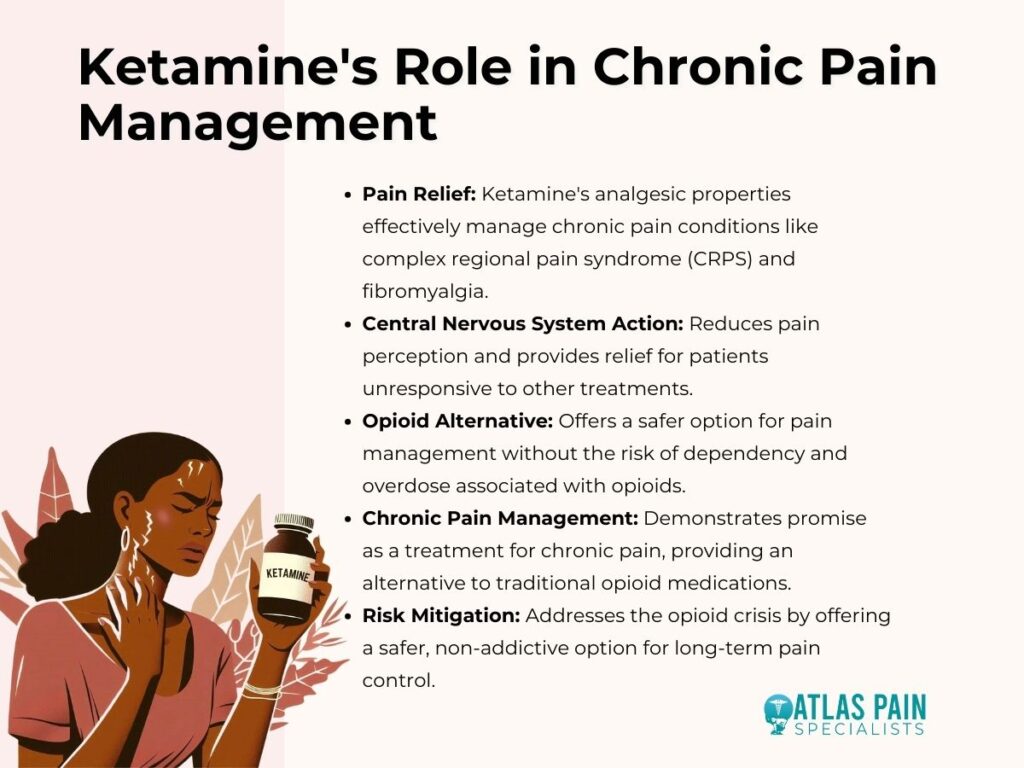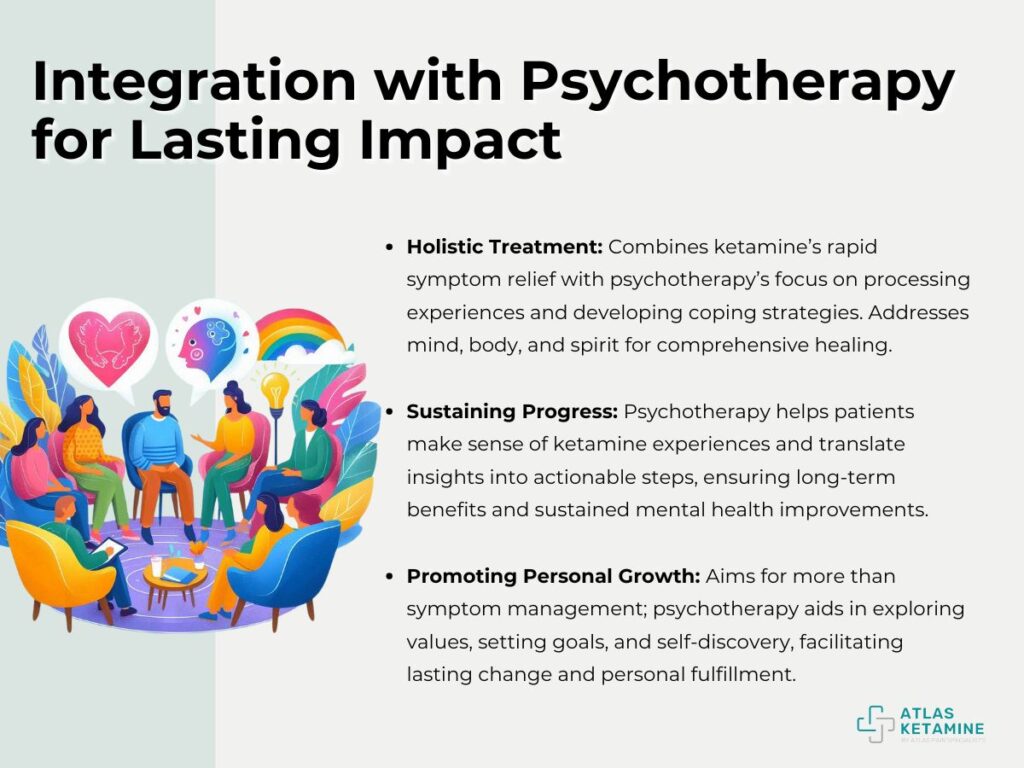The future of ketamine therapy is set to revolutionize the landscape of mental health and pain management. Initially recognized for its rapid antidepressant effects, ketamine's potential is expanding into diverse areas, including anxiety, PTSD, and chronic pain.
Innovative approaches, such as group therapy sessions and telemedicine, are making treatments more accessible, while ongoing research explores their use in enhancing creativity and relationships. However, the rise of at-home treatments underscores the need for stringent regulations to ensure safety and efficacy.
Integrating psychotherapy with ketamine therapy promises comprehensive healing, addressing both symptoms and underlying issues, thus paving the way for transformative mental health care.
- Depression: Ketamine's most well-known application remains in the treatment of severe depression. Unlike conventional antidepressants, which can take weeks to show effects, ketamine often brings about a significant reduction in depressive symptoms within hours. This rapid action can be lifesaving for individuals experiencing acute depressive episodes or suicidal thoughts.
- Anxiety: Emerging studies suggest that ketamine may be effective in reducing symptoms of anxiety disorders, including generalized anxiety disorder (GAD) and social anxiety disorder (SAD). Patients report a marked decrease in anxiety levels, often after just a few treatments.
- PTSD: For PTSD sufferers, particularly those who have not responded well to traditional therapies, ketamine offers hope. It appears to help in reducing the severity of symptoms such as flashbacks, nightmares, and hyperarousal. The exact mechanisms are still being studied, but ketamine's impact on brain plasticity and memory processing may play a crucial role.
- Suicidal Ideation: One of the most critical benefits of ketamine is its potential to rapidly alleviate suicidal thoughts. Traditional treatments for suicidal ideation are limited, and ketamine's quick onset can provide immediate relief, offering a crucial window for further therapeutic intervention.
Ketamine's Role in Chronic Pain Management
Beyond its mental health benefits, ketamine is showing promise as a treatment for chronic pain conditions. Chronic pain affects millions of people worldwide and is often managed with opioid medications, which carry significant risks of addiction and overdose. Ketamine offers a potential alternative:

Pain Relief
Ketamine's analgesic properties make it a valuable tool for managing chronic pain conditions, such as complex regional pain syndrome (CRPS) and fibromyalgia. It acts on the central nervous system, reducing pain perception and providing relief even for patients who have not responded to other treatments.
Opioid Alternative
With the opioid crisis continuing to devastate communities, ketamine represents a safer alternative for pain management. It does not carry the same risk of dependency and overdose as opioids, making it an attractive option for long-term pain control.
New Frontiers: Pre-Surgical Use and Combat Applications
Researchers are continually exploring new applications for ketamine, extending its benefits to pre-surgical settings and even among combat soldiers:
Pre-Surgical Use
Preoperative administration of ketamine can help manage postoperative pain and reduce the need for opioid medications after surgery. This approach not only improves pain outcomes but also reduces the risk of developing chronic pain and opioid dependency.
Combat Stress
In military settings, ketamine is being investigated for its potential to prepare soldiers for the psychological and physical stress of combat. Its rapid effects on mood and cognition can help bolster resilience and reduce the incidence of PTSD among combatants.
Integration of Psychotherapy for Lasting Benefits
The field of ketamine therapy is evolving from a medication-only approach to a more comprehensive model that integrates psychotherapy. This shift is driven by the understanding that while ketamine can produce rapid symptom relief, sustaining these benefits and achieving long-term healing often requires addressing the underlying psychological issues through therapy.
- Combining Ketamine with Psychotherapy: Integrating psychotherapy with ketamine treatment helps patients process their experiences during and after ketamine sessions. The altered state of consciousness induced by ketamine can bring up repressed emotions and memories, which patients may struggle to make sense of on their own. Therapeutic support is crucial in helping patients navigate these experiences and translate insights into meaningful behavioral changes.
- Emotional Processing: Psychotherapy aids in the emotional processing that is essential for healing. Patients can work through trauma, develop coping strategies, and build emotional resilience. This process is vital for converting the temporary relief provided by ketamine into lasting improvement.
- Behavioral Change: Achieving lasting benefits from ketamine therapy involves more than just alleviating symptoms. It requires fostering positive behavioral changes that support mental health and well-being. Psychotherapy provides the tools and guidance needed for patients to make these changes, enhancing the overall effectiveness of ketamine treatment.
The Role of Integration in Long-Term Healing
Integration is not just about combining treatments; it's about creating a cohesive therapeutic experience that addresses the whole person—mind, body, and spirit. This holistic approach is essential for promoting long-term healing and personal growth.
- Sustaining Progress: Without the integration of psychotherapy, the progress made during ketamine sessions can be fleeting. Psychotherapy helps to reinforce the gains achieved with ketamine, providing patients with the skills and support they need to maintain their improvements over time.
- Personal Growth: Beyond symptom relief, the goal of ketamine therapy is to facilitate personal growth and self-improvement. Through therapy, patients can explore their values, set goals, and develop a deeper understanding of themselves. This journey of self-discovery is an integral part of the healing process.
- Community and Support: Integration also involves building a supportive community around the patient. Group therapy, peer support groups, and family therapy can all play a role in reinforcing the benefits of ketamine treatment and providing a network of support.
Improving Accessibility and Regulation
Access to ketamine therapy, despite its proven effectiveness, remains limited primarily due to high costs. However, innovative approaches are emerging to address this barrier and make treatment more accessible to a broader population.
- Group Therapy Sessions: One effective strategy is the implementation of group therapy sessions. By treating multiple patients simultaneously, clinics can reduce individual costs while still providing the benefits of ketamine treatment. Group therapy also offers additional therapeutic value through shared experiences and mutual support, which can enhance the overall healing process.
- Retreats: Ketamine therapy retreats are becoming increasingly popular as they offer intensive, immersive treatment experiences at a lower cost. These retreats often combine ketamine sessions with other therapeutic practices such as mindfulness, yoga, and counseling, providing a holistic approach to healing. By leveraging economies of scale, retreats can make ketamine therapy more affordable while delivering comprehensive care.
- Telemedicine: The rise of telemedicine has opened new avenues for delivering ketamine therapy, particularly in remote and underserved areas. Virtual consultations and follow-up appointments reduce the need for travel and can lower overall treatment costs. Some providers are also exploring the feasibility of administering ketamine in home settings under medical supervision, further increasing accessibility.
Ensuring Safety and Efficacy: The Need for Regulation
The advent of at-home ketamine treatments has sparked significant debate regarding their safety and efficacy. While these treatments offer convenience and accessibility, they also pose potential risks that necessitate stringent regulatory oversight.
- Safety Concerns: Administering ketamine outside of a clinical setting can lead to issues such as incorrect dosing, inadequate monitoring, and potential misuse. Without proper medical supervision, patients may experience adverse effects or fail to receive the full therapeutic benefits of the treatment.
- Efficacy Issues: The therapeutic effects of ketamine are closely linked to the controlled environment in which it is administered. Clinical settings provide a structured, supportive atmosphere that can enhance the treatment’s efficacy. At-home treatments, on the other hand, may lack the necessary conditions for optimal therapeutic outcomes.
- Regulatory Measures: To address these concerns, there is a growing call for tighter regulations governing at-home ketamine therapy. Future regulations are likely to include more structured guidelines to ensure safe administration, such as mandatory medical supervision, standardized dosing protocols, and thorough patient screening processes. These measures will help mitigate risks and ensure that patients receive effective and safe treatment.
Potential for Preventative and Transformative Applications
Ketamine’s therapeutic potential extends far beyond traditional mental health and pain management. Emerging research is exploring its use in various innovative applications, highlighting its versatility and transformative capabilities.
- Enhancing Creativity: Ketamine is being studied for its potential to enhance creativity and problem-solving abilities. By altering brain function and promoting neuroplasticity, ketamine can help individuals break free from rigid thought patterns and explore new ideas and perspectives. This application is particularly relevant in creative fields such as art, music, and writing, where novel thinking is essential.
- Improving Relationships: Another promising application of ketamine is in the realm of relationship therapy. Ketamine’s ability to reduce anxiety and depression can help individuals engage more fully in their relationships. Furthermore, its capacity to promote empathy and emotional openness can facilitate deeper connections and improve communication between partners.
- Preventative Treatment for Post-Traumatic Stress: Ketamine’s rapid and potent effects on mood and cognition make it a promising candidate for preventative treatment in high-risk populations, such as combat soldiers and first responders. Administering ketamine before exposure to traumatic events may help build resilience and reduce the likelihood of developing post-traumatic stress disorder (PTSD).
Integration with Psychotherapy for Lasting Impact
The integration of ketamine therapy with psychotherapy is key to unlocking its full potential and achieving lasting benefits. This combined approach addresses both the symptoms and underlying causes of mental health issues, fostering comprehensive healing and personal growth
.

- Holistic Treatment: Combining ketamine with psychotherapy provides a holistic treatment experience that addresses the mind, body, and spirit. While ketamine offers rapid symptom relief, psychotherapy helps patients process their experiences, develop coping strategies, and implement positive changes in their lives. This integrated approach enhances the overall effectiveness of treatment and supports long-term recovery.
- Sustaining Progress: Psychotherapy plays a crucial role in sustaining the progress achieved through ketamine therapy. By helping patients make sense of their ketamine experiences and translate insights into actionable steps, therapy ensures that the benefits of treatment are not just temporary but lead to enduring improvements in mental health and well-being.
- Promoting Personal Growth: Beyond symptom management, the goal of integrated ketamine therapy is to promote personal growth and self-improvement. Psychotherapy provides a framework for patients to explore their values, set meaningful goals, and develop a deeper understanding of themselves. This journey of self-discovery is essential for achieving lasting change and fulfillment.
Conclusion
Ketamine therapy stands at the forefront of mental health innovation, offering rapid and profound benefits for various conditions. As accessibility improves through creative solutions and regulations tighten to ensure safety, ketamine's role is poised to grow significantly. Its applications extend beyond traditional treatments, potentially enhancing creativity and relationships and serving as a preventative measure for PTSD.
The integration of psychotherapy with ketamine therapy is crucial for sustaining long-term benefits and fostering personal growth. As research and clinical practices evolve, ketamine therapy promises to transform lives, providing a versatile and powerful tool in the future of mental health care.
